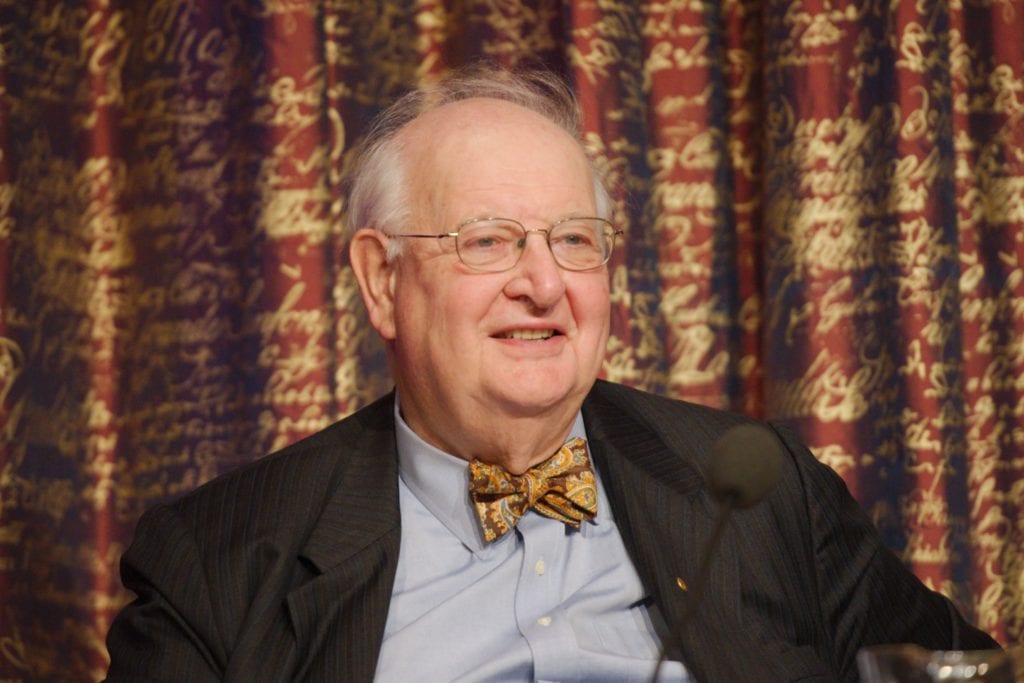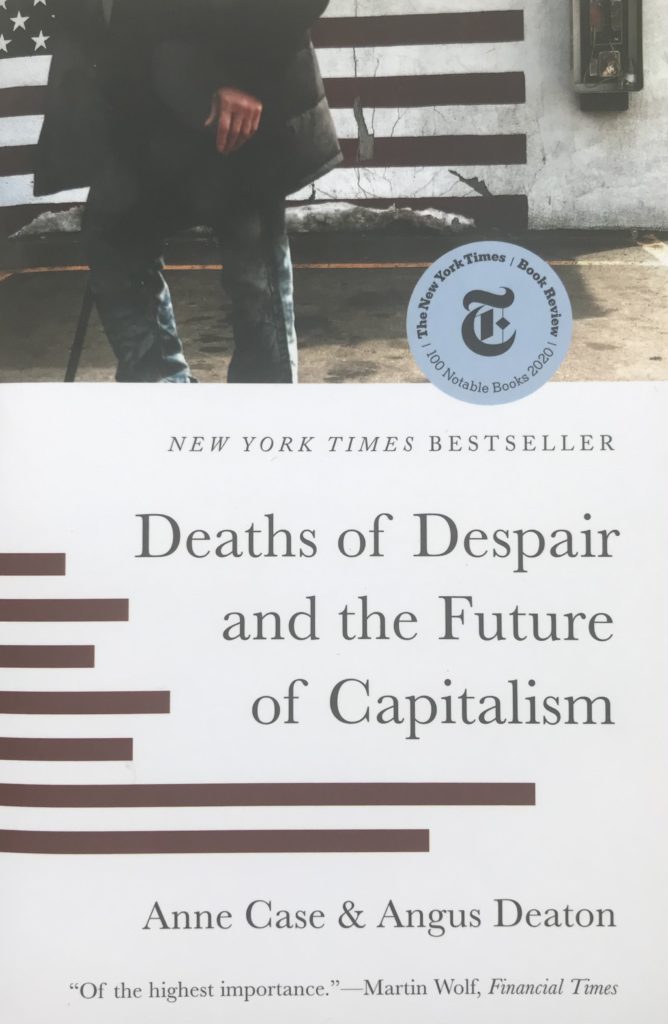
This is the 22nd in a series of articles that celebrate the lives of the Nobel Prize laureates whose names grace the 130+ streets of Laureate Park. These laureates are extraordinary individuals who through their lifetime achievements have made our daily lives immeasurably richer, often in ways not readily apparent. The author wishes to thank his lifelong friend Stephen Malpezzi, an economist and emeritus professor at the University of Wisconsin, for his help in producing this article.
When an Amazon van delivers to your home a book called Deaths of Despair and the Future of Capitalism by the 2015 Nobel laureate in economics Angus Deaton, you know you have a serious volume on your hands. Reams and (electronic) reams of analysis have been produced to explain the political chaos that has engulfed our country over the last decade, but that analysis often offers explanations that only chip around the edges. In contrast, Angus Deaton and his co-author wife, Anne Case, both Princeton University professors, zero in on one specific trend that, in their view, represents the current troubles plaguing our country’s economic – and political – wellbeing. The trend? That white, non-Hispanic Americans with no college degree are dying at increasing rates from suicide, opioid abuse and alcoholism. The root cause for these deaths? Our nation’s broken healthcare system. Residents of Lake Nona’s Medical City, take note.
Intuition would suggest that traditionally poor and marginalized groups, such as African-Americans or Hispanics, should be suffering such early deaths at a faster pace than working-class whites. Or that American working-class whites should not be alone in their despair: Similar mortality rates among Caucasians should be observed in other wealthy countries, for example, in Europe. But that is not what the data say to Angus Deaton. He is convinced that the steady, persistent decline in earnings and life expectancies among American working-class whites over the past half-century is an outlier, a trend peculiar to this country. This is not meant to minimize the continued economic marginalization of minorities. In fact, the COVID-19 pandemic, which has hit minorities harder, has re-widened the gap in untimely deaths between whites and other racial groups.
However, as Deaton would argue, if we are to address the economic inequalities afflicting our country, we must first recognize that analysis of the available data can produce a workable diagnosis for our current ills, a diagnosis needed before effective remedies can be put into effect. And surely, added to our broken healthcare system are further trends that have contributed to our national ills, including the effects of globalization and rising competition; expanded technology in factories; the weakening of unions; ineffective regulation, for example, of the pharmaceutical industry; the growing influence of lobbyists; and decline of community-minded corporations.
Recent photos of Angus Deaton show a kind, grandfatherly gentleman who looks like he walked out of a P.G. Wodehouse novel, if one of those novels had been set in Scotland. The future laureate was born in 1946 in Edinburgh to a family of modest means. Deaton’s father, Leslie, had grown up in a Yorkshire mining village where only a select few could attend high school. Denied entry to the local school, Leslie repaired his education by attending years of night classes, ultimately qualifying as a civil engineer. In his free time, he complemented the schooling of young Angus. With the encouragement and support of his teachers, Angus managed to secure a scholarship to attend Fettes College, Scotland’s most prestigious boarding school. As one of the few students with a Scottish accent, Deaton felt very much an outsider in his own land, among the upper-class English adolescents who populated Fettes. But the school allowed him the freedom to pursue his eclectic interests in physics, mathematics and English as well as music and rugby, the last of which helped him gain entry to Cambridge University.

At Cambridge, Deaton realized that his chosen major, mathematics, held no long-term interest for him, but he struggled to choose a field that would spark real passion. Intent on graduating, he switched his major as a last resort to economics – a subject about which he knew little – hardly thinking how this decision would ultimately transform both his life and the field of economics itself.
A year working at the Bank of England in London left Deaton dispirited professionally, so he returned to Cambridge in 1969, partly to pursue a Ph.D. in economics but mostly to be closer to a Kansan belle, Mary Ann Burnside, his first wife, with whom he had two children. Mary Ann tragically died of breast cancer in 1975 and Deaton, seeking a change of scene, accepted a position as professor of econometrics at the University of Bristol. While at Bristol, Deaton collaborated with fellow economist John Muellbauer in publishing a groundbreaking study of consumption in 1980 called An Almost Ideal Demand System. In their paper, Deaton and Muellbauer explained how to improve econometric estimates of the demand for specific goods, such as food, housing and healthcare, using as a model the consumption patterns in 20th century Britain. The paper has since become a classic work in economics and a must-read for all aspiring economists. In later years, Deaton showed economists a variety of ways in which micro-level data collection, for example, from household surveys, could be improved, and he dug into designing and fielding such surveys in addition to analyzing the data they produced.
In 1983, Deaton left Bristol to take up a professorship at Princeton University. One of the first persons he met at Princeton was fellow professor of economics Anne Case, well known for her own work in public finance and health economics and whom he later married. The pair have forged an unusually productive professional partnership that has bestowed upon us a series of major papers and books on economic issues, some written together and some separately, including two best-selling books for general audiences, The Great Escape and Deaths of Despair.

In The Great Escape, Deaton hails the continuing advances in physical and economic wellbeing enjoyed around the world, advances that found their beginnings 250 years ago, but rues the unceasing growth of inequalities in wealth and wellness. The author’s mastery of data analysis is evident throughout. Of particular interest in this work are probing questions about the effectiveness of development aid (Deaton has had a long association with the World Bank and has taken a special interest in the subject) and the efficacy of the U.S. government’s measurement of the so-called poverty line. The criteria underlying this measurement were developed in 1963 by an economist working for the Social Security Administration and adjusted annually for inflation since, but the underlying structure of the measurement – a calculation based on the cost of food for a family of four in the sixties – has remained unchanged over the past 55+ years. Deaton has also raised similar questions about the World Bank’s “dollar a day” measurement of poverty in developing countries.
Often in these pages, we have profiled Nobel laureates whose accomplishments took place many decades ago or even more than a century in the past. In this case, our laureate, whom Politico Magazine has dubbed one of the 50 greatest thinkers of our age, and his collaborator, Professor Case, wrote the introduction to Deaths of Despair in the pandemic summer of 2020, a summer we would all like to forget. This is a topical book, and the alarming societal problems it describes are ongoing and unsolved. Even worse, they are hardly even acknowledged by our political leaders.
On YouTube, you can find more than a few lectures in which Angus Deaton expounds on his encyclopedic knowledge of the intersection of economics with the study of poverty, inequality, health, wellbeing and development. You might marvel how the accent of a Scottish academic could have acquired such a transatlantic timbre. But this is a man with a message for us, an exceedingly serious message delivered more clearly and incisively through the spoken word. In December 2020, Deaton told us that “American capitalism is not serving most Americans. While educated elites live longer and more prosperous lives, less-educated Americans – two-thirds of the population – are dying younger and struggling physically, economically and socially.” The alarm has sounded, the lights are blinking red. Let’s hope that we heed the warning.
Postscript: If Angus Deaton ever visits Laureate Park (for example, if one day he accepts an invitation to speak at the annual Lake Nona Impact Forum), he would have trouble finding his namesake street, Deaton Alley. That is partly because Deaton Alley oddly lacks a street sign but also because there is no alley to find in the first place. Deaton Alley is what folks hereabouts call a mews, which in Laureate Park takes the form of a lush swatch of lawn and greenery trisected by sidewalks. (Centuries ago, the British coined the term “mews” to indicate a back street lined with stables, but we are unaware of any horses or stables in our neighborhood.) This particular mews offers a beautiful scene, but we can’t help but wonder how the residents of Deaton Alley explain the location of their homes to visiting friends and contractors.


